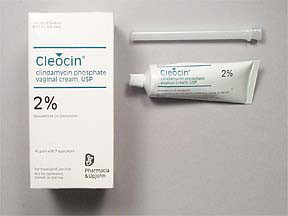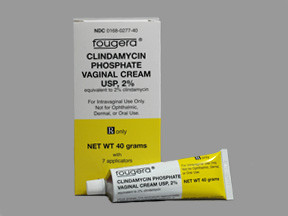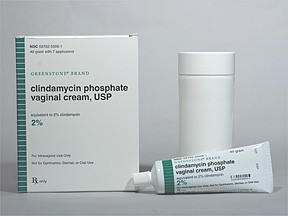CLINDAMYCIN PHOSPHATE CREAM - VAGINAL
PHONETIC PRONUNCIATION: (KLIN-da-MYE-sin FOS-fate)
COMMON BRAND NAME(S): Cleocin
GENERIC NAME(S): clindamycin phosphate
Uses
USES: This medication is used to treat a certain type of vaginal infection (bacterial vaginosis). Clindamycin is an antibiotic that works by stopping the growth of bacteria. See the Precautions section for information about use during pregnancy.
How to use CLINDAMYCIN PHOSPHATE CREAM - VAGINAL
HOW TO USE: Read the Patient Information Leaflet for instructions on the proper use of this medication. Consult your doctor or pharmacist if you have any questions. This product is for vaginal use only. Wash your hands before and after each application. Avoid contact of this cream with your eyes. If it gets into your eyes, wash them right away with plenty of water. Call your doctor if eye irritation persists. Fill the applicator with the cream according to the directions. Insert the applicator high into the vagina and press the plunger to release the medication. Use this product usually once a day at bedtime, or as directed by your doctor. If you have extra applicators, discard each one after use. If you have only one applicator, clean it with warm soapy water and rinse well. Do not boil or use hot water to clean the applicator. To prevent medication from leaking out of the vagina, lie down as soon as possible after use. Antibiotics work best when the amount of medicine in your body is kept at a constant level. Therefore, use this drug at evenly spaced intervals. Continue to use this medication for the full number of days prescribed even if symptoms disappear after a few days. Stopping the medication too early may allow bacteria to continue to grow, which may result in a relapse of the infection. Inform your doctor if your condition persists or worsens.
Side Effects
Precautions
Interactions
Overdose
Images
Reviews
Disclaimer
IMPORTANT: HOW TO USE THIS INFORMATION: This is a summary and does NOT have all possible information about this product. This information does not assure that this product is safe, effective, or appropriate for you. This information is not individual medical advice and does not substitute for the advice of your health care professional. Always ask your health care professional for complete information about this product and your specific health needs.



No Reviews Yet